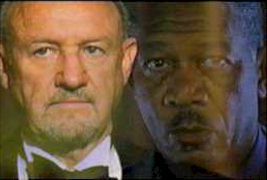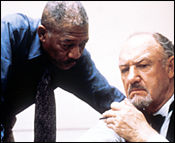

It takes a lot for an ending to ruin a good movie. Especially a movie requires a heavy investment of time and attention. Usually, there is some sort of 'twist' at the end that makes it worthwhile. In the case of a murder mystery, the goal is to show all possible suspects and keep the audience guessing until the last possible minute. Even better if all the facts necessary are present during the movie instead of some mysterious fact popping up at the end which makes everything clear. Under Suspicion does not meet the criteria. Morgan Freeman and Gene Hackman are great actors and the ride to the end is engrossing, but the ending ruins the entire experience.
Everything revolves around the murder of two young girls in San Juan, Puerto Rico. Police Captain Victor Benezet (Freeman, Nurse Betty, Deep Impact) believes the murderer is Henry Hearst (Hackman, Enemy of the State, The Replacements), a prominent tax attorney. On the evening of a fundraiser, Benezet asks Hearst to come in for some questions. Thus begins the clash of wills between Benezet and Hearst. The two know each other well, but their language suggests that they drifted apart. Hearst believes that Benezet is jealous of his success. Also questioning Hearst is Detective Felix Owens (Thomas Jane, Deep Blue Sea, Molly), a hotheaded cop.
Benezet quickly asserts control of the situation. He questions Hearst repeatedly and Hearst's responses begin to change. He remembers differently, contradicting his own statements. Benezet's revelation of witness statements change Hearst's responses further. Benezet asks probing questions about Hearst's relationship with his much younger wife Chantal (Monica Bellucci, L'Appartment, Malena). Hearst believes that this and many other answers are personal, so he lies to Benezet. The majority of the film takes place within Benezet's office, so to keep the viewer from going insane, director Stephen Hopkins (Blown Away, The Ghost and the Darkness) allows people to see what Hearst is vocalizing. If he tells Benezet he is in his car, Hackman is in the car, still talking, and this time Freeman is sitting behind him. It is an interesting device that allows the audience to see the story develop and change as Hearst changes his story.
Freeman and Hackman obviously believed in the project. They both serve as executive producers on the movie. They do a great within the movie, both looking increasingly harried as the night drags on. And writer W. Peter Iliff (Varsity Blues) heaps on the intrigue and suspense in his remake of Garde A'Vue, which is based on John Wainwright's book Brainwash. Benezet and Hearst are clearly uneasy around each other, and this does not help things. Iliff's plot does bring up some issues. Why does Benezet insist on questioning Hearst immediately? He claims it is to prevent murders. But without the interrogation, Hearst (if he is indeed the murderer) will not feel unsafe. Also, the two murders occurred with nearly two weeks between them. Also, why, once Hearst realizes the trouble he is in, doesn't Hearst ask for his lawyer? Heck he is a lawyer, and should know better. The ending is too much of a let down. It raises even more questions than it answers. In a way, it ruins much of the momentum Hopkins, Hackman and Freeman created during the movie. If the movie ended five minutes before it did, it would be much more satisfying.